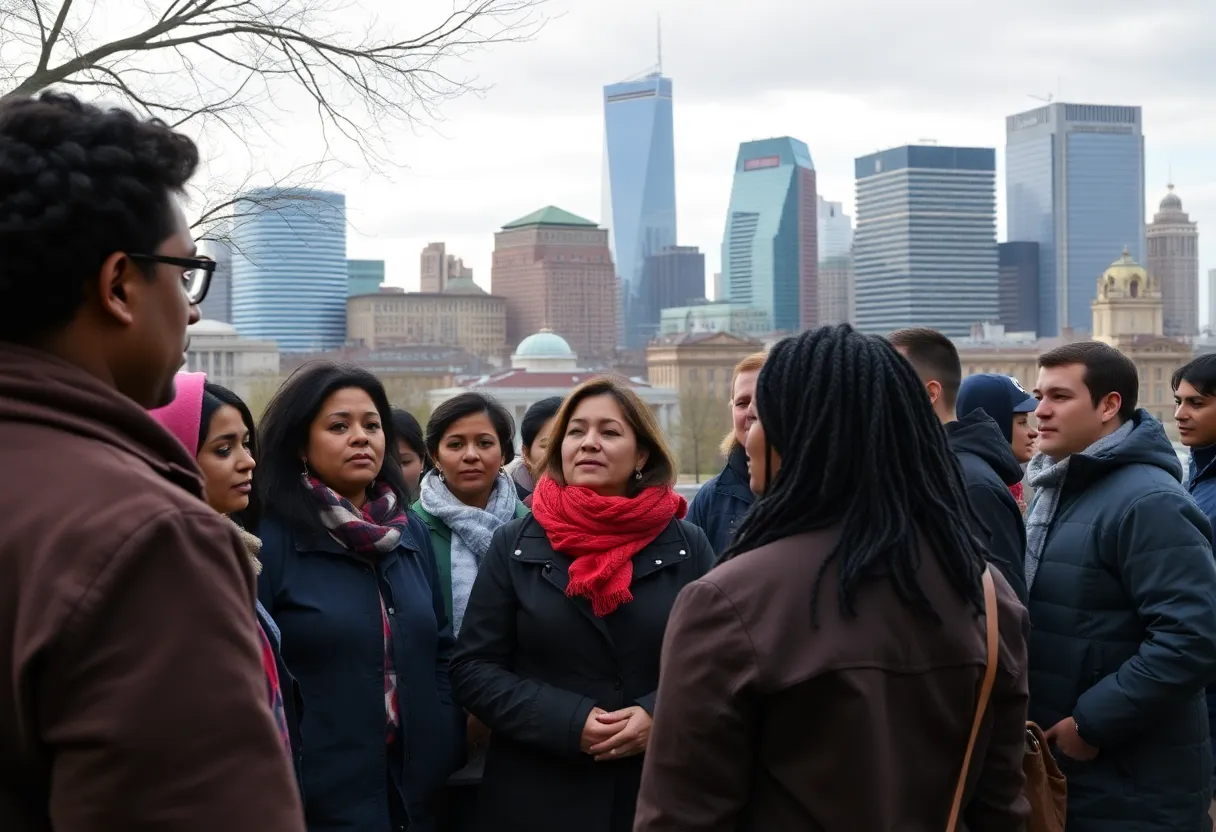Boston, August 30, 2025
News Summary
The federal government plans to deploy immigration enforcement personnel to Boston to confront its sanctuary city policies. This initiative is aimed at cities that limit cooperation with federal immigration authorities and may begin next month. Local officials are preparing for potential federal actions and have raised concerns about public safety and legal implications, amidst a backdrop of rising public concern about crime. Community organizations are advised to prepare for increased demand for legal aid and civil rights support.
Boston
The federal government plans to deploy immigration enforcement personnel to Boston to confront the city’s sanctuary city policies, with operations reportedly possible as soon as next month. The move is part of a broader administration effort to expand crime and immigration enforcement beyond Washington, D.C., and to increase federal action in Democratic-led cities that limit cooperation with federal immigration authorities.
What is happening now
Federal officials have targeted Boston for increased Immigration and Customs Enforcement (ICE) activity. The initiative follows prior federal operations in large cities and comes after recommendations from administration officials that included strong enforcement measures and controversial suggestions for temporary federal control at transit hubs. State and city officials have publicly criticized the proposal for a federal takeover of a major transit station as inappropriate and legally problematic.
Key details and immediate impacts
Reports indicate the enforcement effort will prioritize noncooperative jurisdictions and individuals the administration classifies as criminal threats. The planned actions mirror prior ICE activity in Massachusetts earlier this year, when roughly 1,500 people were detained during a separate round of operations across the state. Local authorities are reportedly preparing for potential federal action by coordinating with state resources, and city officials have indicated they may consider deploying the National Guard in response to large-scale federal operations.
Federal messaging and policy focus
Senior White House staff have framed the enforcement push as a matter of national security and public safety, and the administration is emphasizing its intention to target the “worst criminal” noncitizen cases. Officials have signaled a strategy that links crime prevention and immigration enforcement, and federal leaders have warned of financial consequences for jurisdictions that refuse to cooperate with ICE.
Local government response
Boston city leaders have reiterated the city’s commitment to follow applicable laws while maintaining services for residents. State officials have criticized the idea of federal takeover of local infrastructure, calling such suggestions legally and politically inappropriate. City offices are reportedly preparing contingency plans for anticipated federal operations and reviewing legal and logistical responses, including arrangements for public safety and civil protections.
Supporting context
The planned Boston enforcement fits within a nationwide pattern of stepped-up federal activity in jurisdictions described by the administration as sanctuary cities, following similar actions in other major metropolitan areas. Administration officials have previously traveled or threatened to travel to such cities to press enforcement priorities and to signal a tougher approach toward local policies that limit cooperation with ICE.
Law enforcement and military roles
The prospect of increased ICE presence combined with potential National Guard deployments has raised questions about the line between military support and civilian policing in immigration enforcement. Observers note that using state or federal guard forces for domestic immigration operations may create legal and operational complexities, and could prompt legal challenges or political fallout.
Political and public opinion backdrop
Recent polling has shown rising public concern about crime in large cities, a trend that federal officials may cite to justify broader enforcement actions. The administration’s approach appears intended both to reshape local cooperation on immigration matters and to respond to public sentiment about safety and law enforcement.
Potential legal and community implications
Increased federal enforcement in Boston could lead to a range of local outcomes, including arrests and detentions, heightened tensions between city and federal authorities, and legal disputes over jurisdiction and civil liberties. Community organizations, legal aid providers, and local government offices may see increased demand for services related to immigration status, detainee rights, and civil protections.
What residents should watch for
Residents should monitor official city and state communications for verified guidance on public safety measures, local services, and legal resources. Individuals potentially affected by immigration enforcement are advised to seek legal counsel through recognized legal aid organizations and to stay informed about their rights under local and federal law.
Background on sanctuary policies
Sanctuary city policies generally limit local law enforcement cooperation with federal immigration authorities in order to encourage community trust and focus local resources on local priorities. These policies vary by jurisdiction and can involve limiting detention holds, declining to share certain immigration information, or setting priorities for enforcement. The federal government has long debated the scope of its enforcement authority versus local discretion in public safety and immigration matters.
Next steps and timeline
Officials have indicated that operations could begin as early as next month. Local and state officials are preparing responses, and legal and civil rights groups are expected to monitor and potentially challenge federal actions. The situation is likely to evolve quickly as federal and local officials finalize operational plans and communicate them to the public.
Frequently Asked Questions
Will federal officers arrive in Boston immediately?
Reports suggest enforcement personnel could be sent as soon as next month, but exact timing depends on federal operational planning and coordination with other agencies.
What areas will be targeted?
The reported focus is on jurisdictions and locations described by the administration as noncooperative with ICE. Officials have also discussed major transit hubs and densely populated urban areas as possible focus points.
Could the National Guard be used?
City officials have prepared for the possibility of National Guard involvement. Any use of guard forces would involve coordination with state leadership and raise legal and logistical questions.
What should people do if they encounter enforcement actions?
People should follow official local guidance, seek assistance from qualified immigration attorneys or legal aid organizations, and document interactions while avoiding interference with law enforcement activities.
Are there legal consequences for the city if it maintains sanctuary policies?
The federal government has threatened funding consequences for noncompliant jurisdictions; however, such actions often face legal scrutiny and must comply with federal law and constitutional protections.
Useful information table
| Topic | Description | Where to find help |
|---|---|---|
| Official updates | Watch for announcements from city and state government regarding public safety, services, and any operational notices related to enforcement activity. | City of Boston and Massachusetts state official communications pages and press releases |
| Legal assistance | Immigration-related questions and detentions require qualified legal counsel; legal aid organizations can advise on rights and representation. | Local legal aid networks, immigration clinics, and state bar referral services |
| Community services | Community groups may offer support services, know-your-rights information, and emergency assistance during enforcement operations. | Local community centers, civil rights organizations, and faith-based groups |
| Public safety | Follow verified guidance from local law enforcement for immediate safety concerns; avoid unverified social media reports. | Local police department advisories and official municipal emergency alerts |
Deeper Dive: News & Info About This Topic
HERE Resources
College Students Return to Boston Amid Federal Concerns
Boston Prepares for Annual Move-In Weekend
Boston’s September 1 Moving Day Causes Urban Congestion
Boston City Council to Address Public Health Emergency at Mass and Cass
Regulators Deny Quidnessett Country Club’s Seawall Approval
Coastal Controversy at Quidnessett Country Club Seawall
Shelter-in-Place Order Lifted After Arrest in Shrewsbury
Suspicious Device in Concord Convenience Store Leads to Arrest
Ongoing Search for Missing Teen and Drowning Incident in Framingham
Boston Prepares for Potential Federal Law Enforcement Deployment
Additional Resources
- Politico: Trump Admin Plans Immigration Enforcement Surge in Boston
- MassLive: Report on Boston ICE Blitz
- Boston 25 News: Judge Blocks Trump Funding Cuts
- Wikipedia: Sanctuary City
- Google Search: Immigration Enforcement Boston

Author: STAFF HERE BOSTON WRITER
The BOSTON STAFF WRITER represents the experienced team at HEREBoston.com, your go-to source for actionable local news and information in Boston, Suffolk County, and beyond. Specializing in "news you can use," we cover essential topics like product reviews for personal and business needs, local business directories, politics, real estate trends, neighborhood insights, and state news affecting the area—with deep expertise drawn from years of dedicated reporting and strong community input, including local press releases and business updates. We deliver top reporting on high-value events such as Boston Marathon, Head of the Charles Regatta, and Boston Harborfest. Our coverage extends to key organizations like the Greater Boston Chamber of Commerce and Associated Industries of Massachusetts, plus leading businesses in finance, biotech, and insurance that power the local economy such as Fidelity Investments, Biogen, and Liberty Mutual Insurance. As part of the broader HERE network, we provide comprehensive, credible insights into Massachusetts's dynamic landscape.





